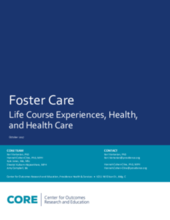Foster Care Experience Study: Executive Summary
Health Share of Oregon collaborated with the Center for Outcomes Research and Education (CORE) to explore how the foster care experience influences people’s lives and their interactions and attitudes about health and health care.
Methods
CORE explored survey data from the Life Course Study (LIFE) – a comprehensive review of life course experiences in Portland, Oregon’s Medicaid population – as well as from the Foster Care Experience Survey and Medicaid claims data. In a mixed methods approach, the study team supplemented quantitative data with qualitative interviews with 12 interviewees who were in foster care as children.
Key Findings
Difficult childhood experiences continued after entering foster care for most. People with foster care histories were significantly more likely to have difficult experiences in childhood compared to people without foster care history. Approximately 89% had four or more adverse childhood experiences (ACES) and 91% felt they had no one to protect or care for them in childhood. Many that entered foster care continued to face substantial challenges including abuse and instability. Very few felt prepared to be on their own when they left foster care.
Difficult experiences also continued into adulthood. People with foster care history were significantly more likely to continue to face difficult experiences in adulthood. While many reported finding and keeping steady work, they still faced significantly more economic insecurity including having to go without needed food, clothing, transportation, and stable housing. People with foster care history also reported more homelessness and verbal abuse by partner/loved one.
In foster care, access to health services was lacking. Most people indicated that they were generally healthy while in foster care except for experiences of physical abuse. Some felt that their physical health needs were neglected by foster parents who would not take them to the doctor. In total, only 40% remembered seeing a doctor as often as needed. While we heard about the need for mental health care while in foster care, 54% reported that they remembered seeing a therapist, and our qualitative findings indicated that the care was inadequate and relied heavily on unwanted medication.
Many experienced poor physical and mental health in adulthood; they felt connected to physical health care but NOT mental health care. People with a history of foster care had worse self-reported health and a much higher prevalence of chronic physical and mental health diagnoses than those without foster care history. While former foster youth tended to have good relationships with physical health providers as adults, they typically avoided mental health care, citing past experiences with over-medication and avoidance of talking about past traumas.
Bottom Line
Foster care is often traumatic and can have a lasting negative impact on an individual’s health and experiences through the entire life course. A pattern of experiences emerged from this study – persistent adversity, instability, and unmet mental health needs in childhood and adulthood for Health Share of Oregon members with a history of foster care. Recommendations for change require systems to come together – from social work to health care – to provide needed care and support in childhood through adulthood.
Recommendations
People with foster care experiences made recommendations for systems change that spanned childhood through adulthood:
- A placement that feels like a home
- Keep siblings together
- More explanation, listening, and empowering of kids while in foster care
- More counseling and talk therapy in foster care
- A supportive network of care
- Peer support or other stable adult support outside of the foster family
- More transitional support when leaving foster care
- Support groups for adults after care

